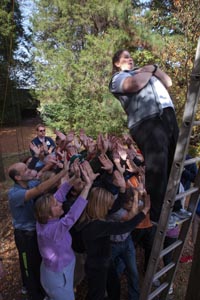Google “What stops migration of leaders?” and you will be bombarded with thousands of websites dedicated to political rhetoric. Ask someone at the University of Alabama at Birmingham (UAB) the same question, and you will find a common answer: the Healthcare Leadership Academy (HLA).
 The joint collaboration between UAB’s Collat School of Business and School of Medicine has helped the university retain promising faculty and staff members at all of its health-focused schools. The HLA, launched in January 2009, welcomed its fifth class of new candidates with a weekend orientation retreat earlier this fall. Leap-of-faith activities like the Pamper Pole and the classic trust fall help members overcome fears and improve communication and teamwork.
The joint collaboration between UAB’s Collat School of Business and School of Medicine has helped the university retain promising faculty and staff members at all of its health-focused schools. The HLA, launched in January 2009, welcomed its fifth class of new candidates with a weekend orientation retreat earlier this fall. Leap-of-faith activities like the Pamper Pole and the classic trust fall help members overcome fears and improve communication and teamwork.
“Health-care systems promote leaders based on career accomplishments, and often physicians are not prepared to work in teams or to lead teams,” said David Rogers, M.D., co-director of the HLA and senior associate dean for faculty development in the School of Medicine. “Our goal is to prepare faculty, the emerging leaders and established leaders, to be successful throughout their careers. HLA shows all the evidence of being able to do that.”
Gaining admission to the HLA is a competitive process. Each division in the School of Medicine — there are 72 split among the school’s 23 departments — nominates candidates for consideration, as do the UAB Health System and the schools of Nursing, Optometry, Dentistry, Health Professions and Public Health. Nominees are reviewed by an advisory panel, and only 24 are chosen. Those accepted then spend approximately 80 hours in class between October and May; they also complete a team project.
From day one, the program has been funded by generous gifts from Founders Investment Banking and the Dore’ Foundation. Founders and the Dore’ Foundation have donated $575,000 to this collaborative group since its inception, with UAB adding $250,000.
 Duane Donner, the managing partner of Founders, grew up in Lafayette, La., but has called Birmingham home for 17 years. He recognized immediately that supporting the HLA meant he was investing in the future of the community where his three children will grow up.
Duane Donner, the managing partner of Founders, grew up in Lafayette, La., but has called Birmingham home for 17 years. He recognized immediately that supporting the HLA meant he was investing in the future of the community where his three children will grow up.
“A community is nothing without strong leaders, and leaders are not born — they are developed,” said Donner. “In our business we look hard at numbers. At the end of 2011, nearly half of the leaders who graduated from the HLA course had already been promoted, and that means this is a great investment for our community.”
Participants include division directors, section chiefs, associate deans, department chairs, administrative officers, executive administrators and managers. The HLA advisory panel looks closely at participants’ diversity in terms of academic specialty, professional background and experience. Program alumni include Jeanetta Keller, Ph.D., chief administrative officer of the UAB Health System; Jeremy Thomas, M.D., medical director of the UAB Emergency Department; and Mike Chen, M.D., chief of staff for UAB Pediatric Surgery.
|
Read more: The Leadership Challenge by Jim Kouzes and Barry Posner is required HLA reading. |
“The future will bring great opportunities, enormous growth and difficult challenges for an academic health center,” said Grant Savage, Ph.D., HLA co-director and management professor in the Collat School of Business. “The HLA is developing leaders that understand the critical importance of collaboration and are adept in the techniques relevant to leading a team in the 21st century.”
“This is great for UAB because now you have a group of people who have been given the gift of being challenged by leadership, who also have strong connections with each other,” Rogers said. “We now have a network of people who are connected and like each other and appreciate each other. That sets up the future of the university in a positive way.”